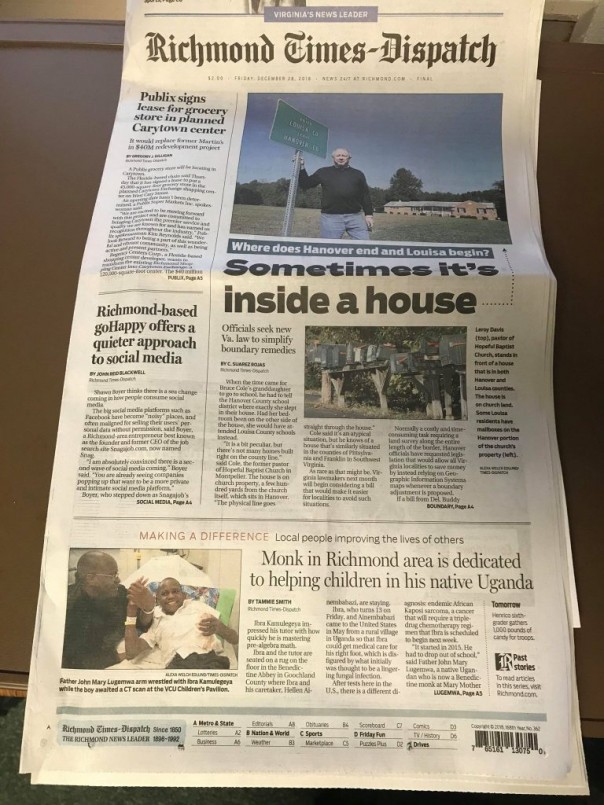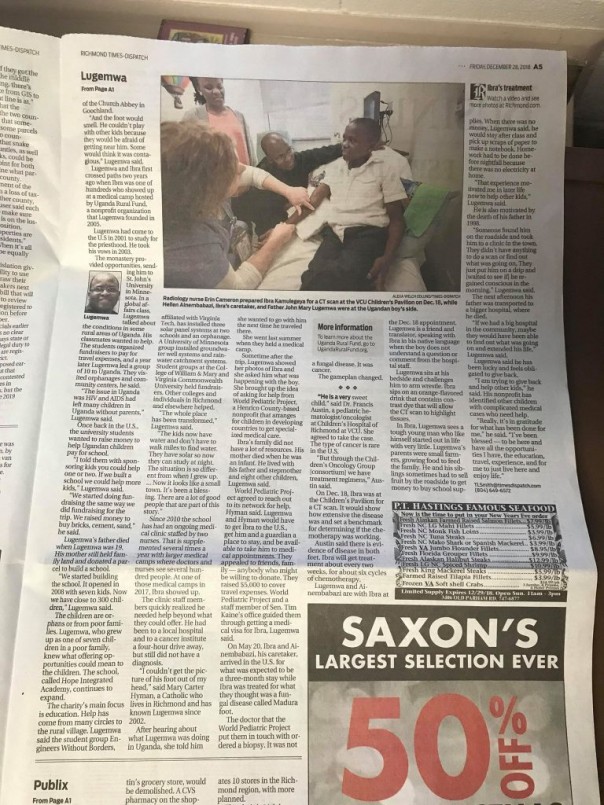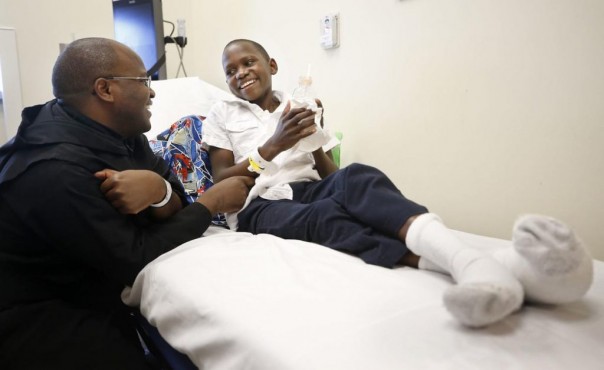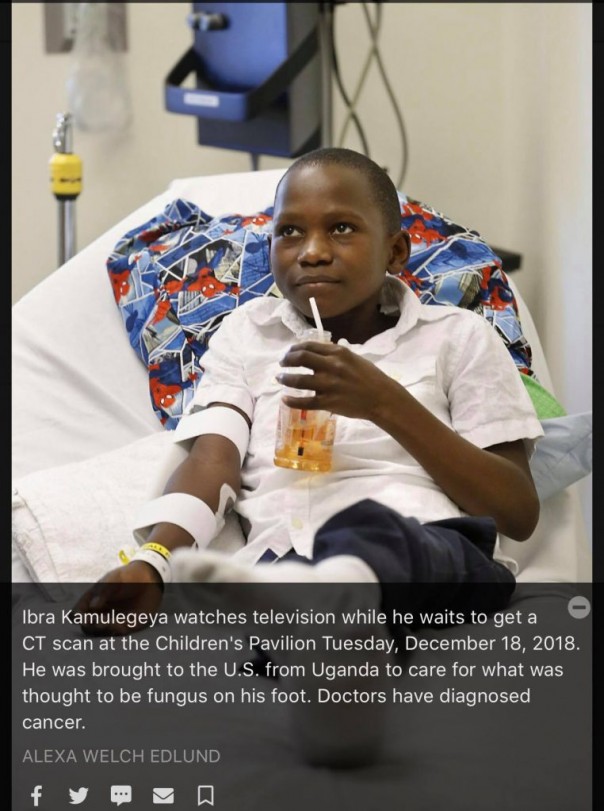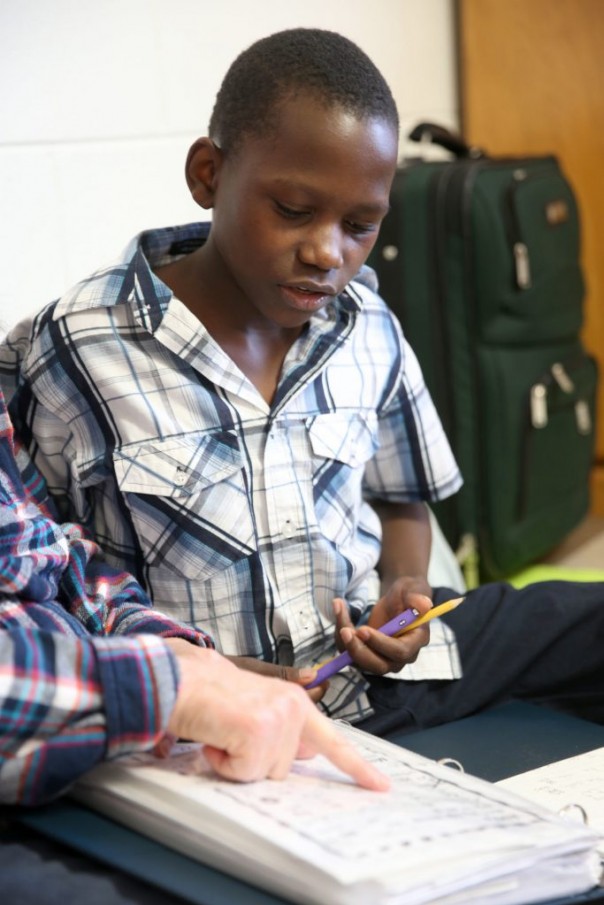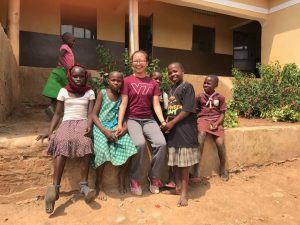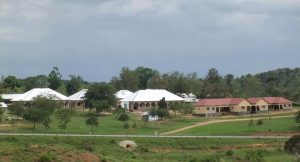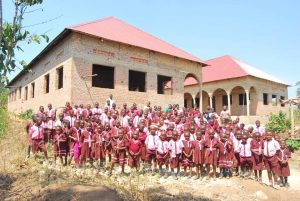Making A Difference: Fr. John Mary and Ibra featured in the Richmond Times Dispatch
This article featuring Fr. John Mary’s story assisting Ibra Kamulegeya, 13, to obtain cancer treatment in the United States was published in the Richmond
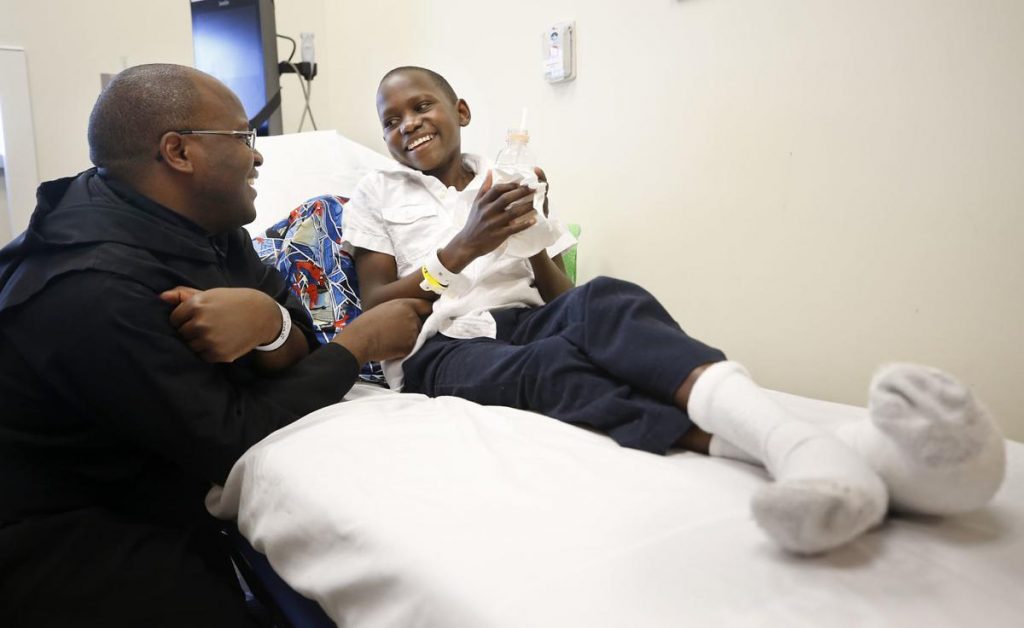
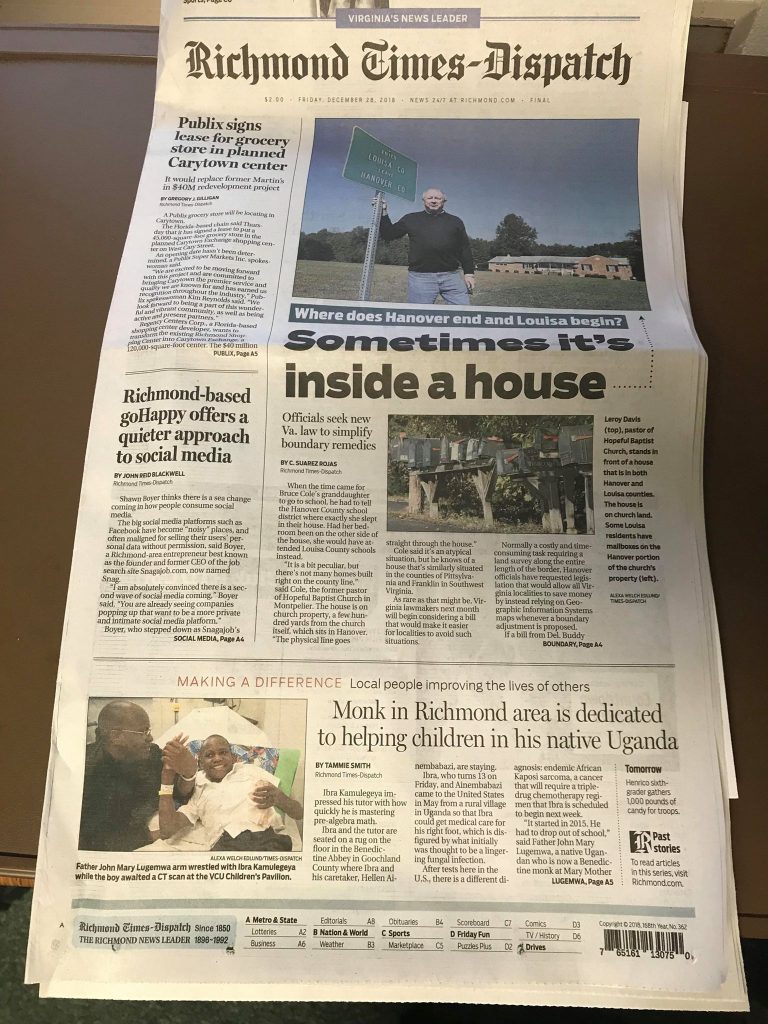
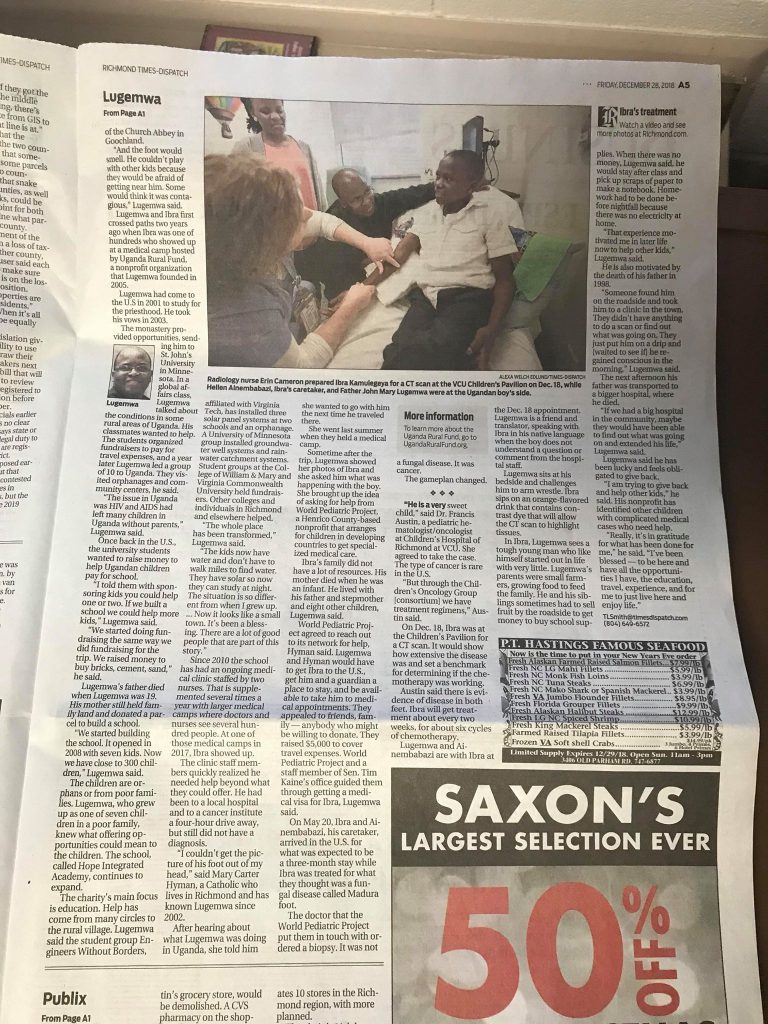
Photos from the hospital visit at the MCV – Children’s Pavilion
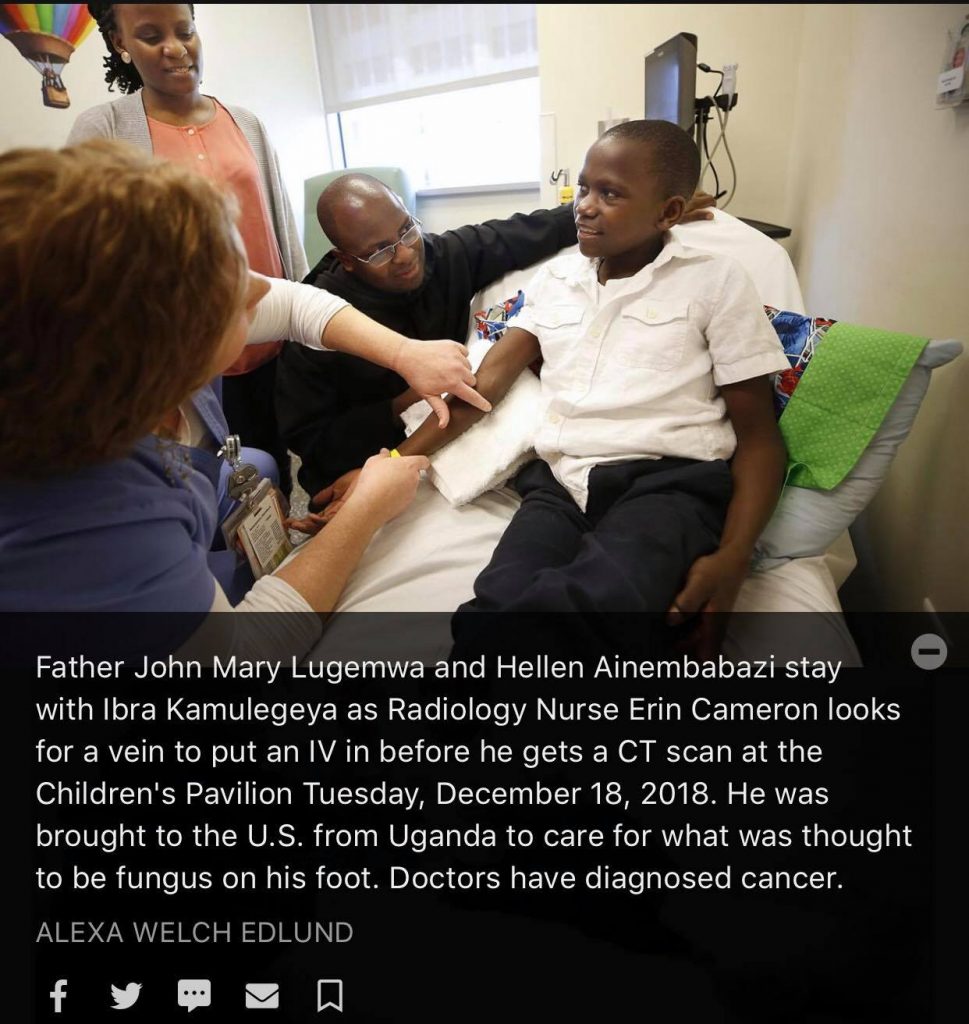
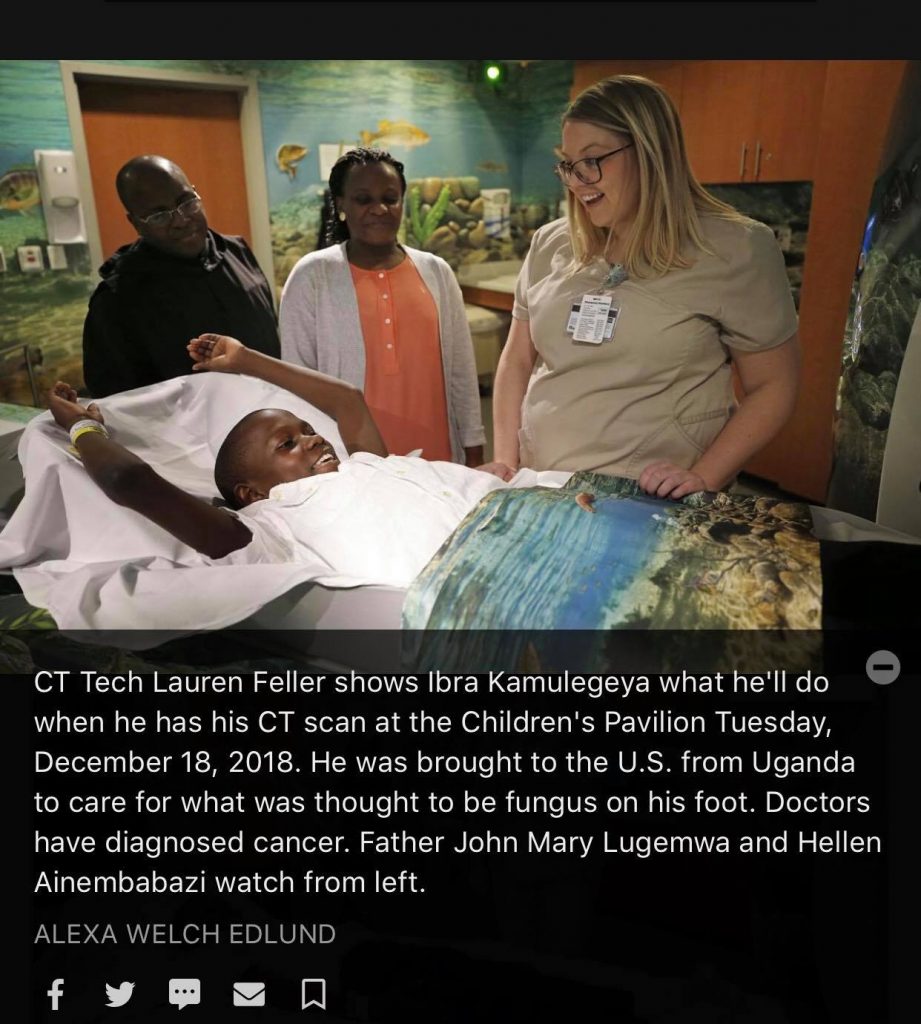
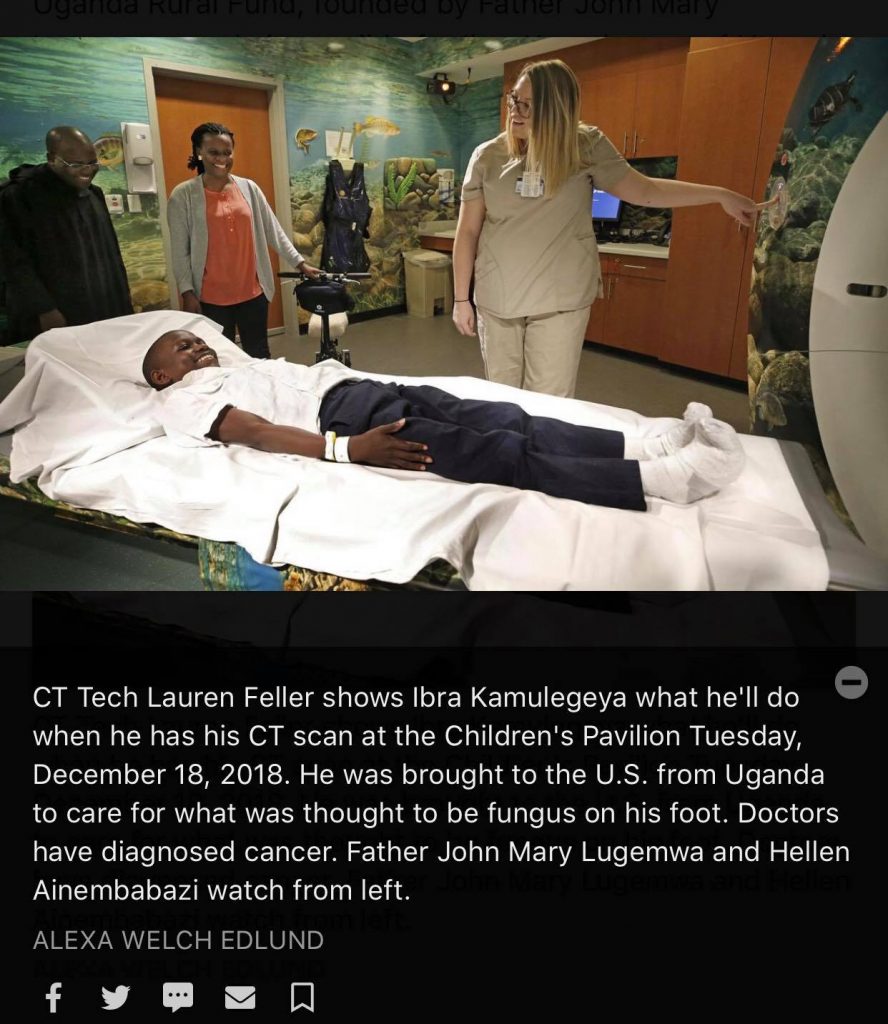
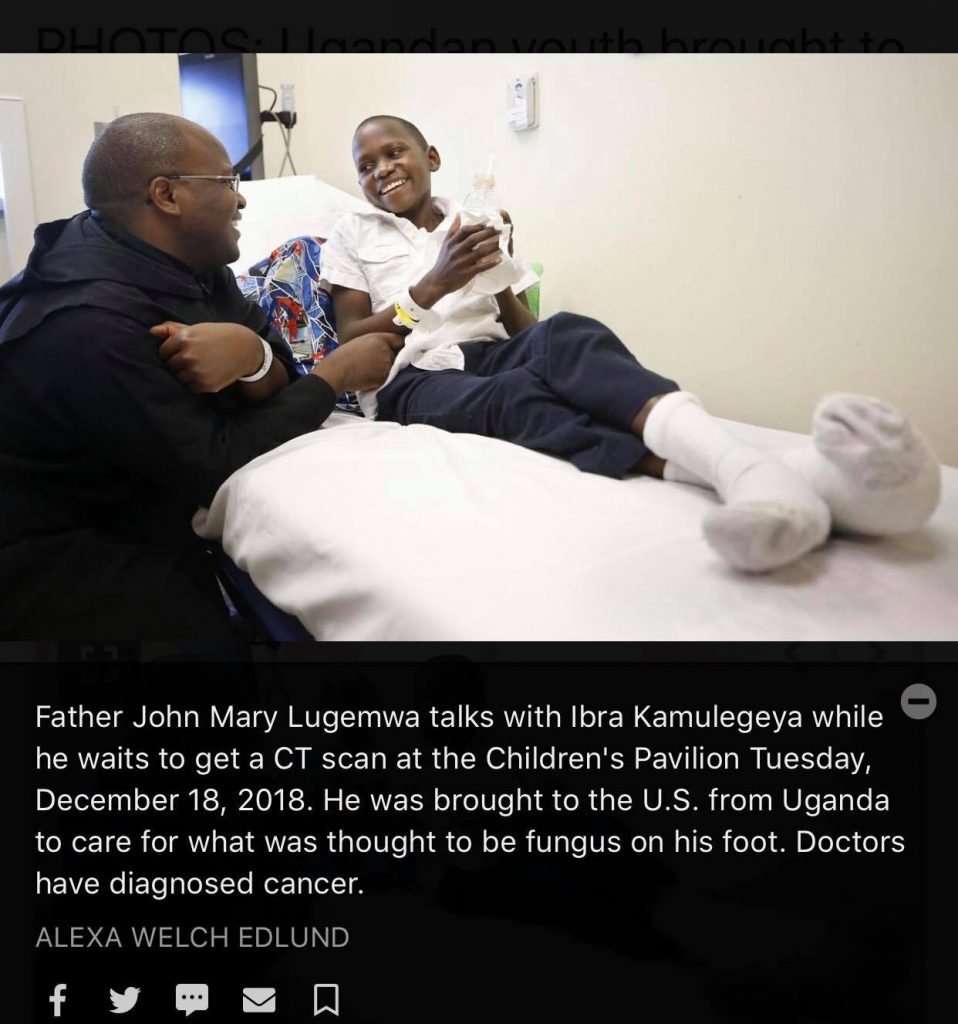
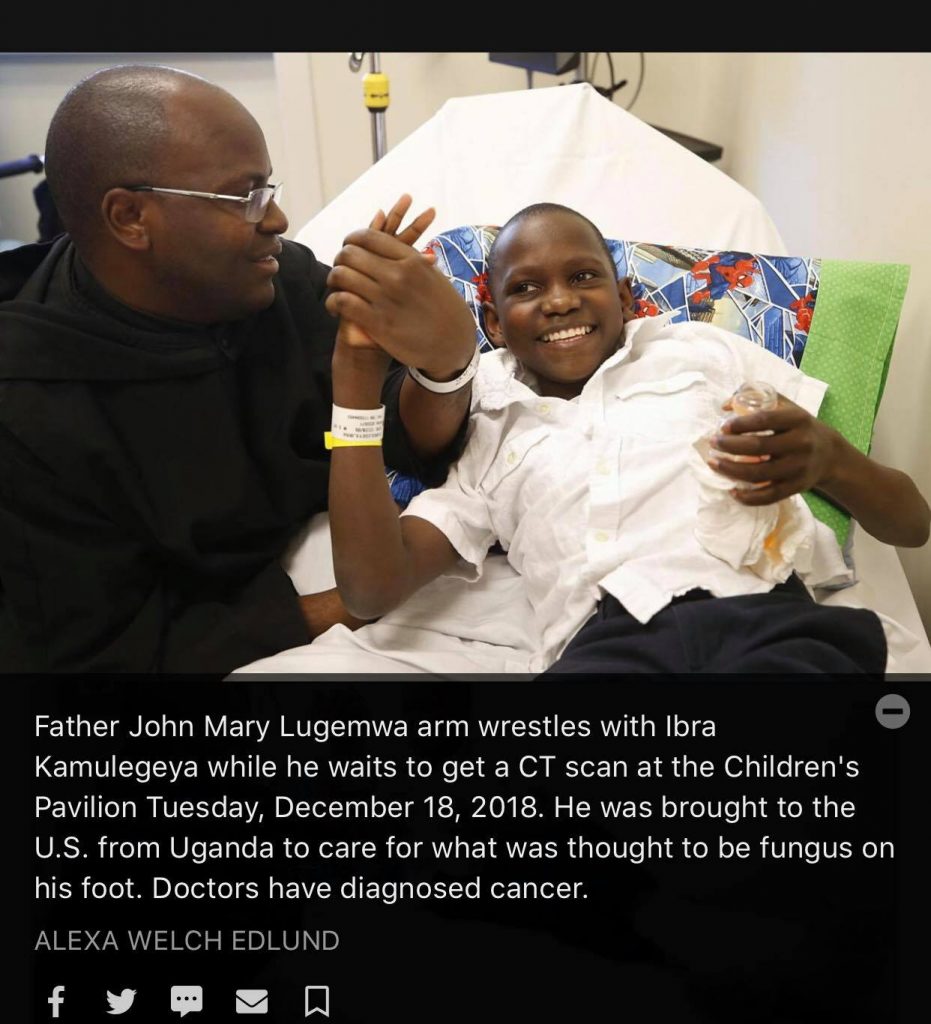
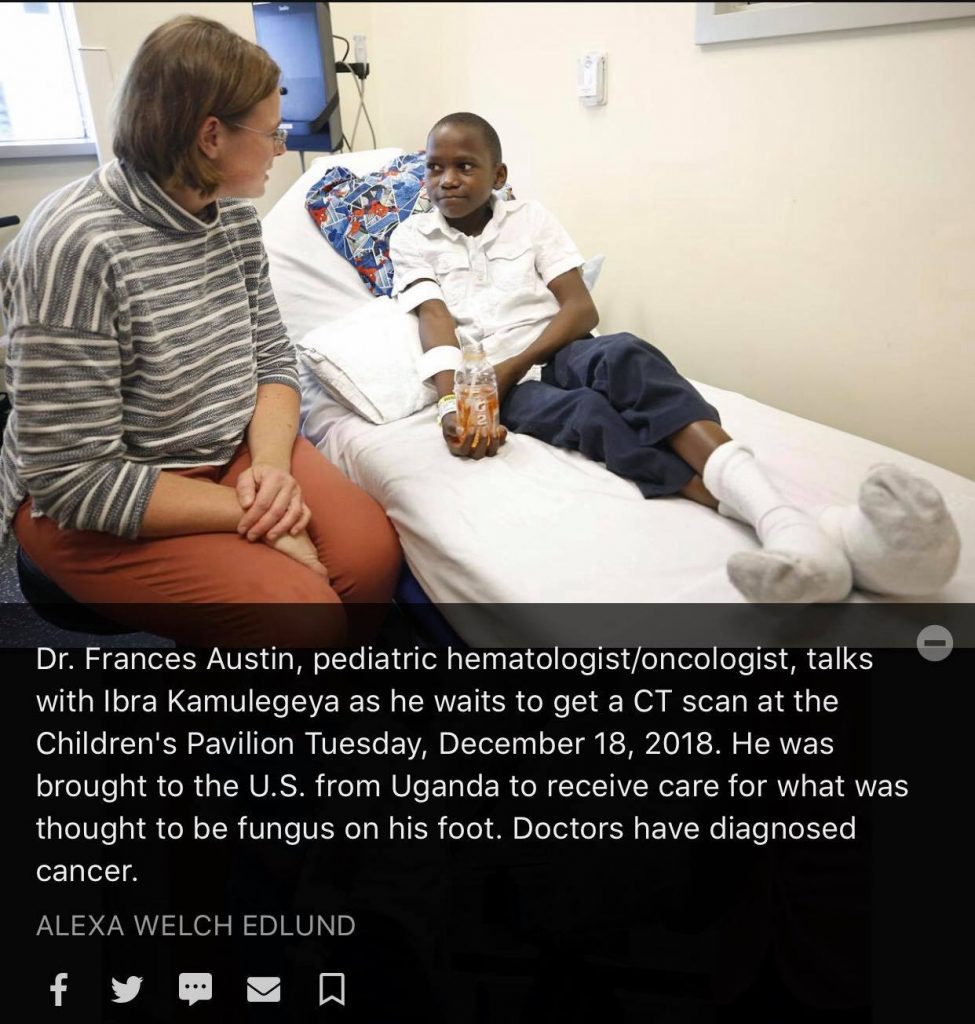
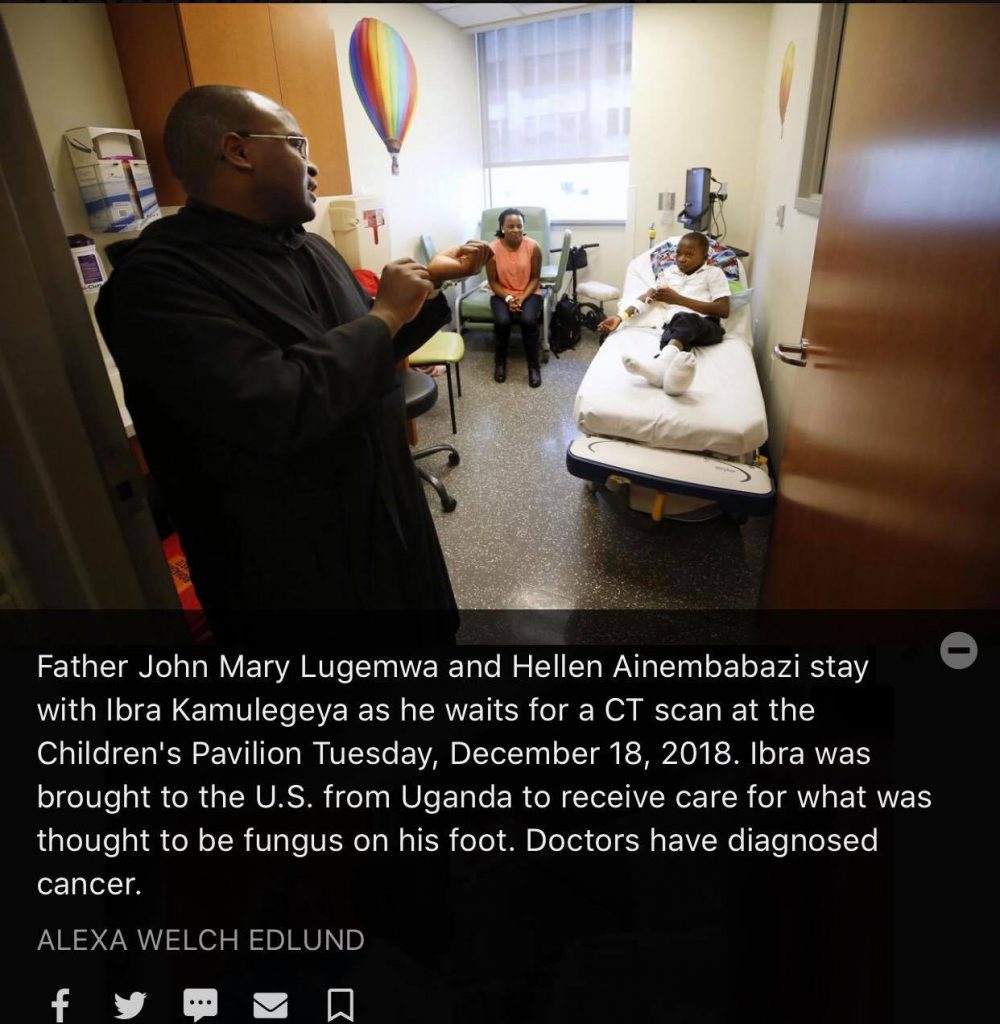
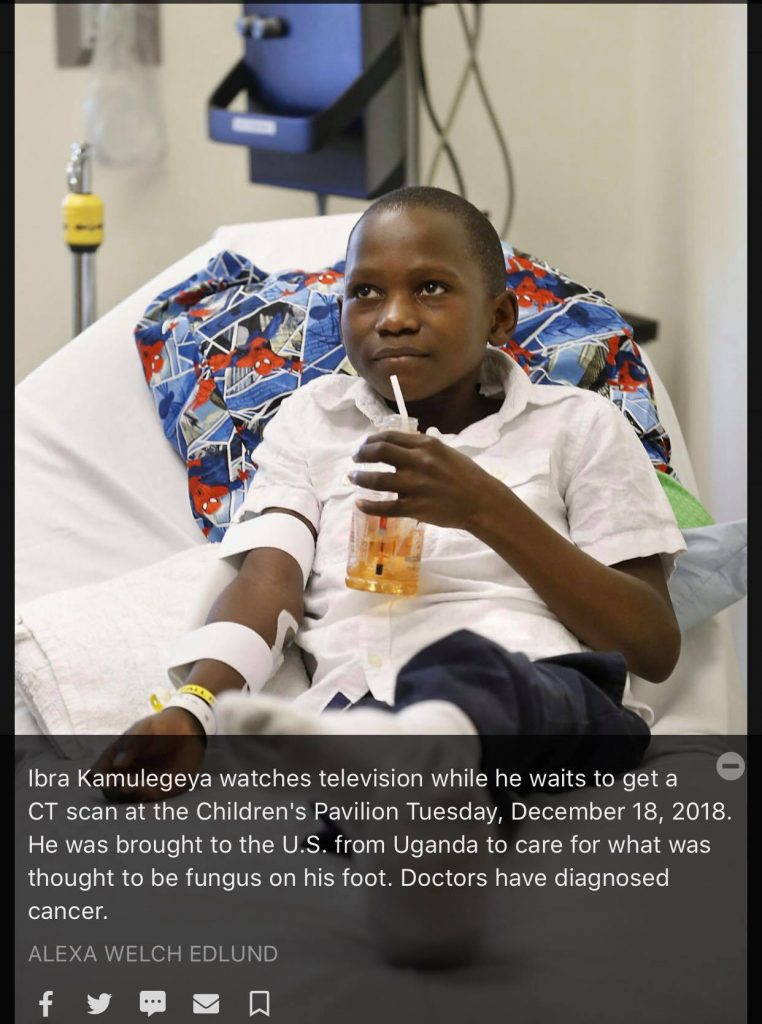
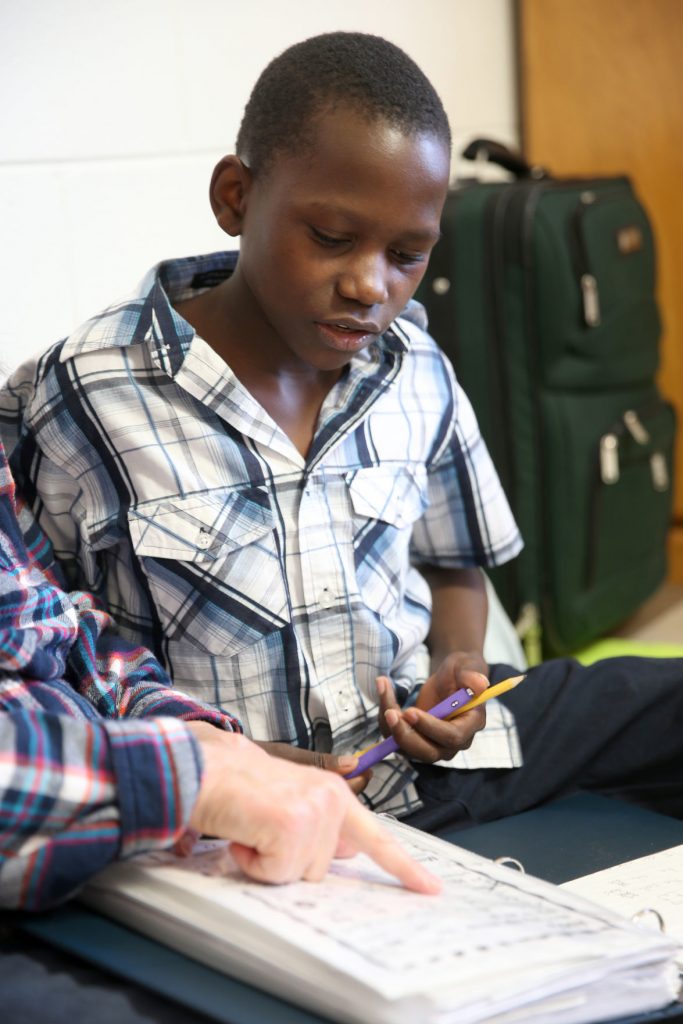
Making A Difference: Father John Mary Lugemwa helping children from Uganda to Goochland County
By TAMMIE SMITH Richmond Times-Dispatch, – December 27, 2018
Ibra Kamulegeya impressed his tutor with how quickly he is mastering pre-algebra math.
Ibra and the tutor are seated on a rug on the floor in the Benedictine Abbey in Goochland County where Ibra and his caretaker, Hellen Ainembabazi, are staying.
Ibra, who turns 13 on Friday, and Ainembabazi came to the United States in May from a rural village in Uganda so that Ibra could get medical care for his right foot, which is disfigured by what initially was thought to be a lingering fungal infection.
After tests here in the U.S., there is a different diagnosis: endemic African Kaposi sarcoma, a cancer that will require a triple-drug chemotherapy regimen that Ibra is scheduled to begin next week.
“It started in 2015. He had to drop out of school,” said Father John Mary Lugemwa, a native Ugandan who is now a Benedictine monk at Mary Mother of the Church Abbey in Goochland.
“And the foot would smell. He couldn’t play with other kids because they would be afraid of getting near him. Some would think it was contagious,” Lugemwa said.
Lugemwa and Ibra first crossed paths two years ago when Ibra was one of hundreds who showed up at a medical camp hosted by Uganda Rural Fund, a nonprofit organization that Lugemwa founded in 2005.
Lugemwa had come to the U.S in 2001 to study for the priesthood. He took his vows in 2003.
The monastery provided opportunities, sending him to St. John’s University in Minnesota. In a global affairs class, Lugemwa talked about the conditions in some rural areas of Uganda. His classmates wanted to help. The students organized fundraisers to pay for travel expenses, and a year later Lugemwa led a group of 10 to Uganda. They visited orphanages and community centers, he said.
“The issue in Uganda was HIV and AIDS had left many children in Uganda without parents,” Lugemwa said.
Once back in the U.S., the university students wanted to raise money to help Ugandan children pay for school.
“I told them with sponsoring kids you could help one or two. If we built a school we could help more kids,” Lugemwa said.
“We started doing fundraising the same way we did fundraising for the trip. We raised money to buy bricks, cement, sand,” he said.
Lugemwa’s father died when Lugemwa was 19. His mother still held family land and donated a parcel to build a school.
“We started building the school. It opened in 2008 with seven kids. Now we have close to 300 children,” Lugemwa said.
The children are orphans or from poor families. Lugemwa, who grew up as one of seven children in a poor family, knew what offering opportunities could mean to the children. The school, called Hope Integrated Academy, continues to expand.
The charity’s main focus is education. Help has come from many circles to the rural village. Lugemwa said the student group Engineers Without Borders, affiliated with Virginia Tech, has installed three solar panel systems at two schools and an orphanage. A University of Minnesota group installed groundwater well systems and rainwater catchment systems. Student groups at the College of William & Mary and Virginia Commonwealth University held fundraisers. Other colleges and individuals in Richmond and elsewhere helped.
“The whole place has been transformed,” Lugemwa said.
“The kids now have water and don’t have to walk miles to find water. They have solar so now they can study at night. The situation is so different from when I grew up. … Now it looks like a small town. It’s been a blessing. There are a lot of good people that are part of this story.”
Since 2010 the school has had an ongoing medical clinic staffed by two nurses. That is supplemented several times a year with larger medical camps where doctors and nurses see several hundred people. At one of those medical camps in 2017, Ibra showed up.
The clinic staff members quickly realized he needed help beyond what they could offer. He had been to a local hospital and to a cancer institute a four-hour drive away, but still did not have a diagnosis.
“I couldn’t get the picture of his foot out of my head,” said Mary Carter Hyman, a Catholic who lives in Richmond and has known Lugemwa since 2002.
After hearing about what Lugemwa was doing in Uganda, she told him she wanted to go with him the next time he traveled there.
She went last summer when they held a medical camp.
Sometime after the trip, Lugemwa showed her photos of Ibra and she asked him what was happening with the boy. She brought up the idea of asking for help from World Pediatric Project, a Henrico County-based nonprofit that arranges for children in developing countries to get specialized medical care.
Ibra’s family did not have a lot of resources. His mother died when he was an infant. He lived with his father and stepmother and eight other children, Lugemwa said.
World Pediatric Project agreed to reach out to its network for help, Hyman said. Lugemwa and Hyman would have to get Ibra to the U.S., get him and a guardian a place to stay, and be available to take him to medical appointments. They appealed to friends, family — anybody who might be willing to donate. They raised $5,000 to cover travel expenses. World Pediatric Project and a staff member of Sen. Tim Kaine’s office guided them through getting a medical visa for Ibra, Lugemwa said.
On May 20, Ibra and Ainembabazi, his caretaker, arrived in the U.S. for what was expected to be a three-month stay while Ibra was treated for what they thought was a fungal disease called Madura foot.
The doctor that the World Pediatric Project put them in touch with ordered a biopsy. It was not a fungal disease. It was cancer.
The gameplan changed.
“He is a very sweet child,” said Dr. Francis Austin, a pediatric hematologist/oncologist at Children’s Hospital of Richmond at VCU. She agreed to take the case. The type of cancer is rare in the U.S.
“But through the Children’s Oncology Group [consortium] we have treatment regimens,” Austin said.
On Dec. 18, Ibra was at the Children’s Pavilion for a CT scan. It would show how extensive the disease was and set a benchmark for determining if the chemotherapy was working.
Austin said there is evidence of disease in both feet. Ibra will get treatment about every two weeks, for about six cycles of chemotherapy.
Lugemwa and Ainembabazi are with Ibra at the Dec. 18 appointment. Lugemwa is a friend and translator, speaking with Ibra in his native language when the boy does not understand a question or comment from the hospital staff.
Lugemwa sits at his bedside and challenges him to arm wrestle. Ibra sips on an orange-flavored drink that contains contrast dye that will allow the CT scan to highlight tissues.
In Ibra, Lugemwa sees a tough young man who like himself started out in life with very little. Lugemwa’s parents were small farmers, growing food to feed the family. He and his siblings sometimes had to sell fruit by the roadside to get money to buy school supplies. When there was no money, Lugemwa said, he would stay after class and pick up scraps of paper to make a notebook. Homework had to be done before nightfall because there was no electricity at home.
“That experience motivated me in later life now to help other kids,” Lugemwa said.
He is also motivated by the death of his father in 1998.
“Someone found him on the roadside and took him to a clinic in the town. They didn’t have anything to do a scan or find out what was going on. They just put him on a drip and [waited to see if] he regained conscious in the morning,” Lugemwa said.
The next afternoon his father was transported to a bigger hospital, where he died.
“If we had a big hospital in the community, maybe they would have been able to find out what was going on and extended his life,” Lugemwa said.
Lugemwa said he has been lucky and feels obligated to give back.
“I am trying to give back and help other kids,” he said. His nonprofit has identified other children with complicated medical cases who need help.
“Really, it’s in gratitude for what has been done for me,” he said. “I’ve been blessed — to be here and have all the opportunities I have, the education, travel, experience, and for me to just live here and enjoy life.”
For more information visit www.ugandaruralfund.org
(804) 649-6572



